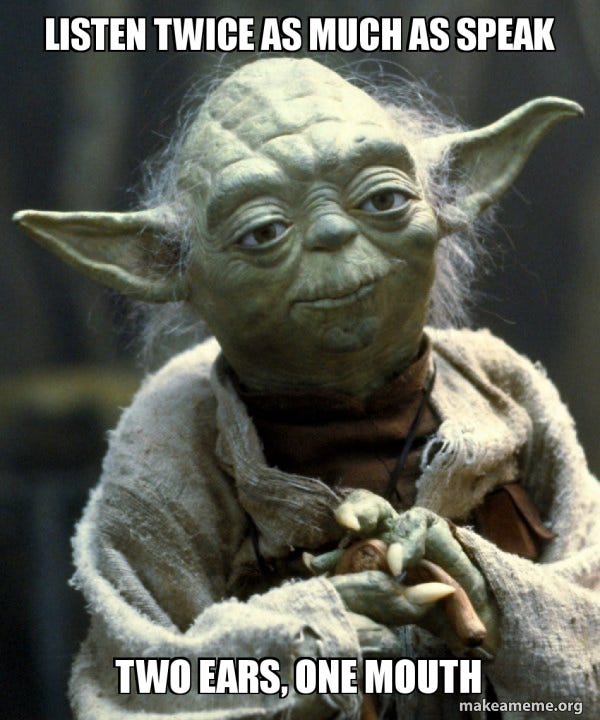There are so many important concepts that get repeated so much that they eventually become distorted and overblown. Recently, in a PM community group, a member asked the question:
Should product managers spend more time listening as they become more senior?
-A Well Meaning PM
The replies were unanimously in favor of speaking less the more senior you become. The thinking went, since PMs are supposed to listen mostly, then as they get more senior they should be even better at it.
Others, stated that early in your career you need to talk more to steer meetings and drive agendas. As your seniority rises, you will have less to say because others around you will do the talking.
Huh?
I hold a strong contrarian opinion on this topic it seems. The context and forum for communication is going to vary the answer to this question considerably. Generally speaking, as you go up higher in your seniority I expect you to bring some experience to the table and offer some more than improved listening skills. In fact, I want to hear from your experience on many issues.
Here are some examples showing seniority alone does mean talk less listen more.
More Listening as you go up
1:1 meetings with your manager
Here as a young PM working with a PM Director, the direct report should be doing the bulk of the conversation and steering the meeting agenda. As the more senior person, your job is coaching and helping them manage obstacles and this definitely
Corporate Meetings to Share Product Info
As you get senior enough to begin running a team of product managers responsible for a suite of products or the entire portfolio, it is your job to drive and position your team for success. This means kicking things off and letting the Jr PMs do the bulk of the presentations and Q&A.
The exception here is when the meeting time is compressed and it is too disruptive to bounce between multiple team members. In that event, you should be having team prep meetings first, where they do the bulk of the talking to prep you. Then in the compressed meeting you do the summary briefing with your team there to support you in ad-hoc Q&A, possibly.
More Talking more as you go up
Team Meetings / Planning Events
If you hosting a meeting for your product area, it will be your job to convey to the team business context and this can often increase as your get more senior.
Take a team of 3 ppl and you are one of the Jr PMs. When you join you will listen mostly, ask questions, provide updates and information on your product area. As you become the Sr PM on this same team, I fully expect you to not only be the individual contributor talking about your area -- but you are expected to impart insights and ideas from your more seasoned experience in the areas of the Jr PMs too.
Product Marketing Planning
From pricing, to sales support, to positioning, as you mature in your career you better be armed with experience to impart. Plus this experience should give you added insights into what can work and where you should focus your efforts together.
Junior PMs may have a lot of ideas and energy. They especially might have some novel ideas that should be shared. However, these should not drive discussions.
No Difference as you go up
Giving a Presentation
Whatever your seniority, if you are giving a presentation - you must speak. People are in the room to hear what you have to say. As you become more senior more speaking opportunities usually arise but once you are there - novice or seasoned veteran - get talking.
Customer Research
It does not matter if you have 1 month on the job or 10 years, if you are conducting customer interviews you need to spend the same amount of time listening and talking. For example, if you are conducting generative idea discovery, you need to give some general prompts and listen to what the customers say. There is not point in your career when you should be talking more in these situations.
Sales Meeting Support
Here you play the role you were brought in for. It does not matter how senior you are. What matters is the value you are being brought into a sales situation for. If you are there to convey real customer stories you have personally experienced then share them. If you are there to listen to help sales strategize on the account, then listen.
Sometimes, as you become more senior, you may be called into meetings just to show a high degree of corporate support. You only get brought into these situations if you are senior. In these, talk little, tell them how much the entire organization is behind this relationship -- then listen.
Bottom Line
The amount of talking v. listening you do is less a factor of seniority and more a factor of specific situational context. Since PMs often have no direct reports the context is the key factor. Not seniority.
Seniority makes more of a difference when you start to manage others. Still, sometimes it means you listen more and standup your team. Sometimes, it means the team needs your experience to be shared so that they can learn from it.




